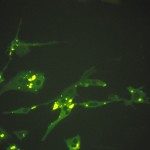Lien vers Pubmed [PMID] – 8880998
Res. Virol. 1996 Sep-Oct;147(5):289-99
Responsiveness of T cells (RTC) was studied in BALB/c mice intramuscularly infected with various lyssaviruses. After infection by this peripheral route, two types of viruses could be classified according to their effects: 1) pathogenic viruses, including fixed rabies Pasteur virus (serogenotype 1) and wild viruses belonging to serogenotype 1 (from a rabid fox in France and from a cow infected by a vampire bat in Brazil) or to serogenotype 5 (European bat lyssavirus 1); and 2) non-pathogenic viruses, including Mokola virus (serogenotype 3). RTC was tested by analysing in vitro the capacity of splenic T cells from infected BALB/c mice to produce cytokines after antigenic (purified lyssavirus antigens) or polyclonal stimulation (concanavalin A). Cytokine production was followed by assaying the biological activity of interleukin-2 and by testing for interleukin-2, interleukin-4 and interferon-gamma (IL2, IL4 and IFN gamma ) messenger RNAs (mRNA) by transcription into complementary DNA and amplification by the polymerase chain reaction. The initial biologically active IL2 and cytokine mRNA production was observed in mice infected with pathogenic or non-pathogenic lyssaviruses. Only mice with symptoms (infected with pathogenic viruses) lost the capacity to produce cytokines in vitro after antigen-specific stimulation. No such loss was observed after polyclonal stimulation. In mice peripherally infected with non-pathogenic viruses, no loss was observed after stimulation with lyssavirus antigens. Thus, infection with pathogenic lyssaviruses by the peripheral route induces in BALB/c mice a loss of T-cell responsiveness after antigen activation, but not after polyclonal activation.
